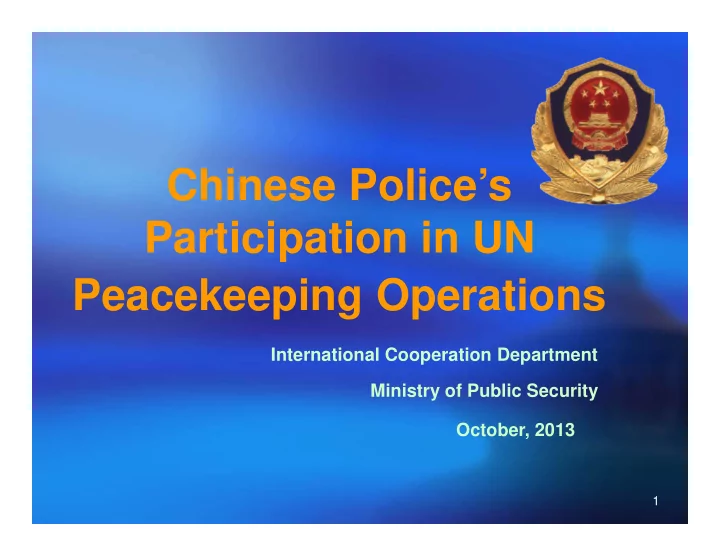

Chinese Police’s Participation in UN Peacekeeping Operations International Cooperation Department Ministry of Public Security October, 2013 1
Scope of Presentation Overview of the participation Leadership and responsibilities Selection and recruitment Pre-deployment training Experience in training Chinese police performance 2
1. Overview of Participation 1998.6 decision-made 1999.5 commencement of training 2000.1 first deployment to UNTAET 2001.1 first deployment to UNMIBH 2001.4 founding of the Special Committee for Peacekeeping Affairs within the MPS 2003. 12 first deployment to UNMIL 2004.1 first deployment to UNAMA 2004.4 first deployment to UNMIK, 2004.5 first deployment to MINUSTAH 2004.10 first deployment of FPU to MINUSTAH 2005.5 first deployment to UNMIS 2011.7 first deployment to UNMISS 2013.9 first deployment of FPU to UNMIL 3
Deployment (2000 to date) MINUSTAH UNMIK UNMIBH 8 FPU1004,103 UNPOL 73 UNPOL 20 UNPOL UNAMA 3 POLICE ADVISER UNTAET UNMISET UNMIT 319 UNPOL UNDPKO 4 Police Officers 4 Police Officers UNMIS UNMISS UNMIL 80 UNPOL 29 UNPOL 171 UNPOL,14 FPU 4
2. Leadership and Responsibility Ministry of Public Security (MPS) Special Committee International Cooperation Provincial (Municipal) Border Control Public Security Department Department (ICD) Department Peacekeeping Police Division China Peacekeeping Police Training Center (CPPTC) UNPOL in Missions Candidates Standing by 5
3. Selection and Recruitment Selection Criteria Criteria Enhancement: Expertise in College 5-7 yrs 2 yrs Driving Language Forensics, IT, Education Police Experience Competence Training Experience 6
Pre-deployment Procedure Application Preliminary Training with Provincial Public Security Department Selection Test Pre-deployment Training UN SAT Deployment Debriefing 7
4. Pre-deployment Training UNPOL Course Core Pre-deployment Training Material Specialized Training Modules Basic skills: English, driving, weapon handling and shooting Policing Skill Mission Background SOP Cultural awareness Team Building Etc. 8
FPU Training Two phases First phase: 1 month separate course for different groups Commanders: to study about mission and task Duty officers: to focus on language study Logistics officers: to familiarize with new equipments, facilities and weapons Second phase: 2 months collective course for the whole unit 9
FPU Course Theoretical : Introduction to Peacekeeping, Mission background, tactical theory, Human rights and Law enforcement, discipline and etiquette, stress management Operational : FPU guidelines, SOP, Rules of Engagement, Operation Plan, crowd control, VIP safeguarding, convoy escort, checkpoint, person and premise search, armed patrol, emergency evacuation, first aid, special skills and tactics. 10
11
12
China Peacekeeping Police Training Center Established in March 2001 Located in Chinese People’s Armed Police Academy, Lang fang, 50 KM South of Beijing Investment: about $25 Million 13 13
14
5. Experiences in Training Capacity building of the trainers Field experience in UN missions International exchange and cooperation Going out to learn Inviting experts to help Experienced police peacekeepers as part-time trainers Seminars and workshops 15
5. Chinese Police Performance 16
17
18 Many Thanks!
Recommend
More recommend